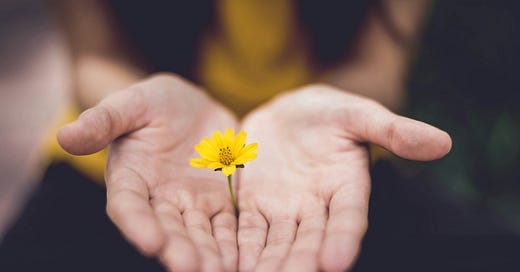I’m currently reading the book Already Free by Bruce Tift and wow, I highly recommend it. It is full of so many golden pieces of knowledge and insight. This morning, I came across one idea that really resonated: the importance of not interpreting our embodied experiences.
What does this mean? Bruce shares an example of a client who came to him feeling "dead inside" and wanting to eliminate this feeling. Rather than exploring her past to uncover the root of this pattern, he asked her a powerful question: Why are you so against participating in the truth of your experience? He then encouraged her to describe the physical sensations she associated with this "dead" feeling. She noted uncomfortable sensations in her chest and throat, prompting him to ask, Is this harming you? Is this damaging you? Is this killing you? He then invited her to give herself permission to feel these feelings without creating any stories around them.
I feel like a lot of us already (in an intellectual way) know that what we resist persists. We know that it is important to fully accept our different feelings and emotions without judging them, weaving stories around them, or pushing them away. But knowing and practicing are two very different things.
When I read this passage, it hit me hard. I realized that even though I’m familiar with the practice Bruce describes, I rarely actually apply it! For example, just yesterday I was deep in an anxiety spiral and instead of just feeling the physical sensations of my anxiety I was caught in a game of mental gymnastics. I was trying to understand where the anxiety came from, why it has come back even though I thought I had a handle on it, and how I could alleviate it (banish it so it would never come back ideally). And it all boiled down to one thing: I wanted to stop the feeling of anxiety in my body.
Now why do I avoid feeling the physical sensations of my anxiety? (Is what I wondered to myself). Let’s be real - anxiety, grief, and anger, are not the classic feel-good feelings that we strive for in our daily lives. Often they manifest in our bodies in ways that can be physically uncomfortable (tightness in our chest, discomfort in our gut, etc.) But when I really thought about it I realized that, although these feelings are undeniably uncomfortable, they aren’t harmful. They won’t kill me.
My brain almost had to do a double-take because somewhere deep down I had been operating under the belief that these sensations were an actual threat to my well-being. I saw them as something to fear and that is why I was always running away from them! It sounds so silly now, reading these words, but I really was afraid of the embodied experience of my anxiety. I didn’t want to feel the discomfort.
Coming to this moment of insight has felt incredibly exciting. This simple realization, that the physical symptoms of my anxiety are not actually harmful, feels like a revelation. How did I not understand this before? I attribute most of this to my sympathetic nervous system, which is constantly on the lookout for danger and focused on keeping me safe. In reality, my body was simply trying to protect me—but from a threat that wasn’t actually there.
Now is the time to start putting this understanding into practice. I want to build a new relationship to my anxiety, beginning with a commitment to accepting that it is a part of my life (and most likely always will be). That is what Bruce talks a lot about - how the goal is not getting rid of our vulnerabilities but interacting with them differently. After all, these feelings are a part of us, and trying to push them out of our lives is like rejecting a piece of ourselves, creating further division inside of us.
I want to accept and show kindness to all of my parts, acknowledging that no part is inherently good or bad! Each one has a place within me and something valuable to teach.
How does the idea of embracing our embodied experiences without interpretation land for you? What has been your journey with your difficult emotions and vulnerabilities? I would love to hear your thoughts in the comments below!
Sources:
Tift, B. (2015). Already free: Buddhism meets psychotherapy on the path of liberation. Sounds True.





